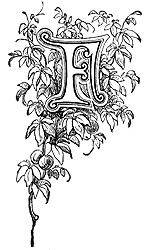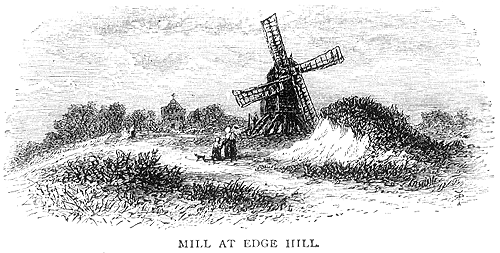And this lovely spot was two hundred odd years ago polluted by the blood of brethren in that most hateful of wars, a civil one; the battle of Edge Hill is memorable also for being the first of that cruel strife. The royal army amounted then only to two thousand men. The Earl of Lindsey, who had gained some military experience by service in the Low Countries, was general. The king's nephew, Prince Rupert, the finest cavalry officer of his day, commanded the horse; Sir Jacob Astley, the foot; Sir Arthur Aston, the dragoons; Sir John Heyden, the artillery; Lord Bernard Stuart, a troop of guards. "The estates and revenues of this single troop," says Hume, "according to Lord Clarendon's computation, were at least equal to those of all the members who, at the commencement of the war, voted in both Houses. Their servants made another group, were commanded by Sir William Killigrew, and always marched with their masters." With this army the king left Shrewsbury, and only two days after, Essex and the Parliamentary army left Worcester. "Though it be commonly easy, in civil war, to get intelligence, the armies were within six miles of each other ere either of the generals was acquainted with the approach of his enemy. Shrewsbury and Worcester, the places from which they set out, are not above twenty miles distant, yet had the two armies marched ten days in this mutual ignorance. So much had military skill, during a long peace, decayed in England." 1 The royal army lay before Banbury, the Parliamentarians at Kineton. Prince Rupert sent to inform the king of the enemy's approach, and though the day was far advanced, 2 Charles resolved to attack them. The prayer and charge of Sir Jacob Astley before this battle are so admirable that we cannot omit them. "O Lord," he said, "Thou knowest how busy I must be this day. If I forget Thee do not Thou forget me! March on, boys!" Essex drew up his men to receive the Cavaliers. He had on the left wing of his army a Sir Faithful Fortescue, who had levied a troop to serve in Ireland, but had been compelled to serve in the Parliamentary army, and was now commanded by a Scotchman, named Ramsay. As soon as he saw the royal army advancing, Fortescue ordered his men to fire their pistols into the ground, and went over with them to Prince Rupert. Partly through this occurrence, and partly from the furious charge of the Prince, the cavalry of Essex instantly fled, and were pursued for two miles. The right wing of his army was not more fortunate. They were put to flight by Wilmot and Sir Arthur Aston. The king's reserve, commanded by Sir John Byron, seeing the flight of both wings, thought, like inexperienced soldiers, that the day was won, and, anxious for some share in the fight, followed the chase at once. Sir William Balfour, who commanded Essex's reserve, saw the advantage thus offered to him, wheeled about upon the royal infantry, now left without horse, and dashed in amongst them, slaying right and left. Lindsey fell mortally wounded, and was taken prisoner; his son, trying to rescue him, was also taken. The royal standard bearer, Sir Edmund Verney, was slain, and the standard taken, but it was afterwards recovered. Thus Rupert found the fight when he returned from his reckless chase. It looked as if defeat were to be expected instead of victory, and several gentlemen entreated the king to leave the field, but he indignantly refused. The two armies faced each other for some time, and neither felt inclined to renew the contest. The feelings of both sides during that pause must have been terrible; brothers cannot, at first, shed the blood of brothers unmoved. It must have been one of the saddest nights ever passed in England, while those two armies lay under arms all night in sight of each other. Next morning, as if heartsick, they did not renew the battle. Essex first drew off, and retired to Warwick; the king returned to his former quarters. Both sides claimed the victory, and it must certainly be regarded as a drawn battle. The king took Banbury a few days after, and then continuing his march took possession of Oxford, the only town on whose loyalty he could entirely depend. Mr. Fisher, the Vicar of Kineton, at the request of Lord Essex, numbered the killed of Parliamentary forces left on the field; they amounted to a little more than 1,300. The slain were buried on two spots still to be distinguished; one of them is planted with fir trees that have their roots in a deep pit, into which five hundred bodies were thrown. The farm on which they stand is called Battle Farm, and the two places of burial, the Grave Fields; they are about half-way between Radway and Kineton. Edge Hill was fought October 23rd, 1642. It was Sunday. When Charles learned the state of Lord Lindsey, he wished to send him a surgeon, but it was useless. As long as the gallant Cavalier lived he reproached the Parliamentary officers for their treason and disloyalty. Near the Round-house on the hill is a spot called Bullet Hilt from the vast quantity of bullets that have been taken out of it. It would appear to have received the hottest fire of the Parliamentary army, who evidently were not expert marksmen. Within view is the church of Barton Dasset, which is supposed to be the spot from which Cromwell, it is said, viewed the battle. Hooper states that he was not in the fight; afterwards excusing himself to the Earl of Essex by alleging that he could not come up in time. He was then but a lieutenant or captain, and watched the action from a church tower near, and seeing the flight of the Parliamentary cavalry he slid down the hell-rope and rode off; showing, as the historian remarks, what great endings may grow out of indifferent beginnings. This story, which we repeat to contradict it, is utterly false. Carlyle has proved that at this battle "Cromwell was present and did his duty.... The fight was indecisive, victory claimed by both sides. Captain Cromwell told cousin Hampden that they never would get on with a set of poor tapsters and town apprentice people fighting against men of honour. To cope with men of honour they must have men of religion. Mr. Hampden answered, It was a good notion if it could be executed! Oliver himself set about executing a bit of it, his share of it, by-and-by." (Carlyle.) Oliver was captain of the 67th troop of Lord Essex's cavalry, and his eldest son Oliver, then a young man of twenty, was a cornet in troop eight of the cavalry. The two boy-princes, Charles and James, watched the battle from the hill, and during the temporary danger of the royal army might have been easily taken. In the village of Radway, at the foot of the hill, is a cottage in which tradition says the king and his sons breakfasted the morning after the battle, and an old table was shown years and years ago as the one on which their breakfast stood. Dr. Thomas, in his additions to Dugdale, tells us that "as King Charles I. marched to Edgcot, near Banbury, on October 22nd, 1642 (the day previous to the battle), he saw a gentleman hunting in the fields not far from Shuckburgh with a very good pack of hounds, upon which, fetching a deep sigh, he asked who that gentleman was that hunted so merrily that morning, when he was going to fight for his crown and dignity. And being told that it was Richard Shuckburgh, of Upper Shuckburgh, he was ordered to be called to him, and was by him (the king) very graciously received. Upon which he immediately went home, aroused all his tenants, and next day attended on him (the king) in the field, where he was knighted and was present at the battle. After the taking of Banbury, and his Majesty's retreat from those parts, he went to his own seat, and fortified himself on the top of Shuckburgh-hill. Here he was soon attacked by the parliamentary forces, and defended himself till he fell, with most of his tenants about him; but being taken up, and life perceived in him, he was carried prisoner to Kenilworth Castle, where he lay a considerable time, and was forced to purchase his liberty at a dear rate." Charles II. rewarded the son, John de Shuckburgh, by creating him a baronet in 1660. He doubtless remembered that he, riding by his father's side, had seen blithe Richard Shuckburgh hunting merrily on that fatal October morning. In 1809 a very sad event occurred in the family of this loyal gentleman's descendants. The Bedfordshire militia were at that time stationed near Shuckburgh Park, and the officers visited at the Hall. Sir Stewkley Shuckburgh had a remarkably beautiful and charming daughter, who was admired by all of them; but a young subaltern, Lieutenant Sharp, fell desperately in love with her. He had many opportunities of wooing her in the beautiful park and in the rooms of the old country-house, and by degrees he won her heart. A correspondence commenced; but as soon as Sir Stewkley heard of it, he forbade the engagement. The beautiful girl listened to her father's arguments against the match; its unsuitableness; its being, really, for her a mesalliance, and consented to sacrifice her affection to the wishes and reasons of her parents. She wrote her resolution to Mr. Sharp; he was forbidden the house, and finding that she was resolute in her obedience to her parents, he consented to the renunciation of his beloved, and they agreed to return each other's letters. It was arranged that she should leave the packet containing his letters in a garden summer house, where they had sometimes met, on the evening of Saturday, March 25th, 1809, and that during the night he should take it and leave her letters, that she could find on the morrow. Early on Sunday morning, therefore, she took the way to the summer-house. The extreme earliness of the hour, and the knowledge that most servants manage to gather of the family secrets, induced a footman to follow her stealthily. As he drew near the summer-house he heard the voices of Mr. Sharp and his young lady in earnest contention. The officer was loud and vehement, the young lady gentle, tender, but resolute. Suddenly there was the report of a pistol and the fall of a body, followed instantly by another report and fall. The servant, greatly terrified, flew hack to the house and aroused Sir Stewkley. He and the rest of the family hastened to the summer-house, and found in it the beautiful Miss Shuckburgh and her mad lover lying dead on the floor. Mr. Sharp was the son of a gentleman farmer, living at the Priory farm, near Bedford; he was very handsome and amusing, and undoubtedly Miss Shuckburgh had resigned him unwillingly and as a concession to duty. Some people thought therefore that they had agreed to die together, but the servant's eavesdropping contradicts this idea, and brands the unhappy young suicide alone with the fatal deed. The truth must, however, always remain a mystery. The place is almost entirely changed since that sad tragedy occurred, and has been much improved, but the memory of this strange and pathetic story lingers still about the park of Shuckburgh. |
||||

